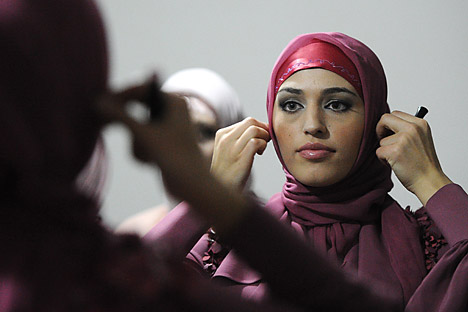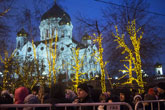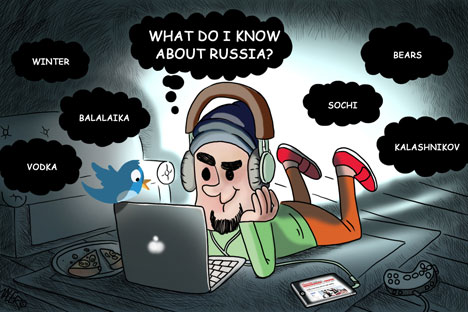What is it like to be a Muslim in Russia?

Muslims made up about 7 percent of Russia’s population. Source: Ramil Sitdikov / RIA Novosti
Muslims are the second largest religious denomination in Russia, and they have peacefully coexisted with Orthodox believers over many centuries. However, in recent decades, Russians have started behaving warily towards Muslims, on the background of internal instability and terrorist attacks. Muslims themselves are asking fellow citizens not to confuse the faithful believers with those who call themselves Muslims, but actually do not follow the norms of Islam. Theologians, in their turn, are asking people not to associate terrorism with Islam, and to use education in preventing conflicts.
Russia is not only an Orthodox country
There is no official data on the number of Muslims in Russia. However, in the last census in 2002, the number of traditional Muslim people in Russia was about 14.5 million, which represents 10 percent of the population. According to the estimates of the Spiritual Administration of Muslims in the European part of Russia, the adherents of Islam in Russia at that time numbered about 20 million. In November 2013, a Levada Center survey showed that Muslims made up about 7 percent of Russia’s population.
In Russia, there are regions where the population is traditionally made up of Muslims, such as the republics of the North Caucasus (Ingushetia, Chechnya, Dagestan, Kabardino-Balkaria, and Karachay-Cherkessia), and Tatarstan and Bashkortostan.
Not all the people who call themselves Muslims follow religious rituals. According to a survey carried out by the Sreda Research Center, only 42 percent of Russian Muslims said that religion plays an important role in their lives, and they follow all the religious orders.
The number of Muslims in Russia continues to grow throw births, especially among the people of the Northern Caucasus. Moreover, the number of Muslims is also increasing because of immigration, mainly from Central Asia and Azerbaijan.
Hide the shawl
Azamat came to Moscow from Kabardino-Balkaria, and he often faced a lack of understanding about who Muslims are. “Many see the defiant behavior of the people from the Caucasian republics and think that all Muslims behave the same way, but this is not true. A true Muslim will not molest a girl on the street, for example, and he will not drink or smoke. The most important thing for a religious man is to lead a righteous way of life, to pray, to help relatives or even neighbors. If your neighbor has nothing to eat, and you live in a wealthy house, then you are not living righteously,” he said.
He noted that all the people, who know him and his wife, behave very well towards Muslims. “I work in a store and my colleagues understand when I’m doing namaz,” he explained. “They know me and understand that this is very important to me.”
Azamat said that it is extremely frustrating when vulgar people say that they are Muslims. He says that such behavior of theirs just scares people, who do not understand his religion.
Zulya was born in and has lived all her life in Moscow. She has always been a Muslim, but she started wearing traditional clothes only four years ago, after she married and gave birth to two children. Despite a higher education diploma, she managed with great difficulty to get work as a nurse in a daycare. “The director told me that another Muslim nurse worked there before. She wore traditional clothes and the parents, whose children attended the institution, wrote a petition against the Muslim nurse that looked after their kids. Therefore, I had to hide my religion, not to lose my job.”
Zulya said she has problems within her coworkers as well, because of suspicions towards Muslims. “The speech therapist asked one of the educators about me. She was interested whether I was one of those who organized explosions. Although she always talks with me, and has never asked me directly about it,” says the girl. “I have lived in Moscow all my life, and have never felt a negative attitude, and my friends have never talked about it. It is true that I have never worn a headscarf.”
Diana works as a doctor and conceals the fact that she is a Muslim. She even wears a tattoo, which is strictly forbidden in Islam. She says she is trying to start a new life, one that would have no association with Muslim foundations.
Traditions of good neighborhood
Mufti Farid Salman, the chairman of the Ulema Council of the Russian Association of Islamic Accord, said that the problem of hostility towards Muslims is not seen in all Russian regions. “In the Volga region, there are no differences between people of different religions, they are neighbors, friends and colleagues. Despite the religious tenets, people of one religion do not seek to convert others to their faith,” says the theologian. “As a result, our close friends are followers of different religious traditions.”
The mufti notes that Tatar Muslims have always lived peacefully next to Russians. However, in order to disseminate such an experience, it is necessary to work hard and spend a huge amount of money. “We need a certain public policy. I am surprised sometimes by the words of our politicians, who continue to use terms of nationality and religion when referring to terrorists. We should not do that. These people have moved away from God and the law,” Salman said. “The mass media does not always understand that such definitions divide people.”
The spiritual leader said the situation is also tense when it comes to immigrants of Muslim origin. “Such disparaging attitude towards immigrants generates xenophobia and Russians forget that the new arrivals are just as decent people as they themselves are. It is necessary to implement a public education program for the current generation,” he explains. “We have forgotten that during the Great Patriotic War, immigrants from Central Asia and the Caucasus also served in the army and defended our common homeland.”
All rights reserved by Rossiyskaya Gazeta.
Subscribe
to our newsletter!
Get the week's best stories straight to your inbox


